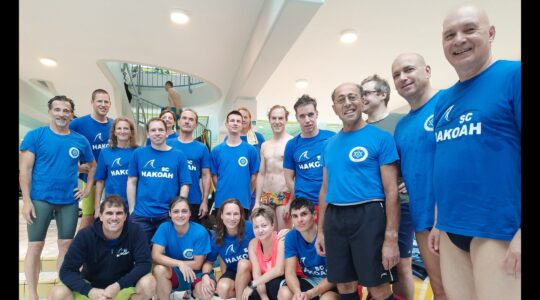BUENOS AIRES, Argentina (JTA) — Rarely if ever had an Argentinean president praised work done by the Jewish community in front of so many people.
An employment program launched more than 35 years ago by AMIA, the main Jewish community organization in Argentina, has been a godsend for thousands of Argentineans — and like most of AMIA’s programs, the beneficiaries haven’t just been Jews.
“AMIA is a formidable ally of this government, and AMIA’s Employment Network is an honor for all of Argentineans,” President Cristina Fernandez de Kirchner told an audience of 800 earlier this month at the annual fund-raising dinner for the program at the Buenos Aires Hilton Hotel.
The Employment Network, now Argentina’s largest, started in 1974 as part of AMIA’s Social Service Department to help unemployed Jews looking for jobs and provide a free hiring service for Jewish-owned businesses seeking for personnel.
During the Argentinean economic crisis of the late 1990s, the program grew rapidly and widened the range of beneficiaries to non-Jews. It also became vital during the economic crisis of 2001, when Argentina experienced an unemployment rate above 25 percent and an estimated 40 percent of the country fell below the poverty line.
“You don’t have to be a member of the Jewish community to benefit from the services,” said Pablo Devita, who found a job through the network. “This is something highly remarkable.”
The program’s work during the 2001 economic crisis was supported by the Inter-American Development Bank, which helped enlarge its jobs network with a budget of approximately $3.5 million. Half is provided by the Inter-American Development Bank’s Multilateral Investment Fund and the rest is financed by AMIA.
Between 2002 and 2008, 16,000 placements were made at more than 9,000 companies. The Employment Network now has 10 offices throughout Argentina and an estimated budget of $1 million for this year.
In addition, it works with companies and nongovernmental organizations on joint actions to help the unemployed.
Juan Heredia was one of them. He lost his job when his security doors company Pentagono downsized, and turned to the Employment Network for a course in facilities and electricity appliance. Eventually he landed a job as chief of maintenance in a major community center called the Hurlingham Club, in the facilities areas.
"We are not Jews and they never asked us if we were," Heredia’s wife, Silvina, told JTA, adding that "I am very grateful to the job service of the Jewish community."
Heredia lost 46 pounds because of the depression he fell into during his two years without a job.
“Juan not only regained self-confidence but also thanks to this new job, we were able to keep our house,” Silvina said.
Some 10,000 people a year now use the network’s free services and workshops, and about 2,000 find a job through the service — on average nine a day. The Employment Network has a database of more than 600,000 job seekers.
Within the Employment Network, the Subsidized Employment Program is one of the more unusual initiatives. It matches unemployed people who have registered in AMIA’s database with companies that are looking to hire. The program subsidizes 30 percent of the new employee’s salary for the first six months and covers the cost of recruitment.
AMIA provides a team of expert interviewers who assess the profiles of candidates according to companies’ needs. The team presents its choices to the companies and based on the information, the companies decide which candidate suits them best.
“They have the final say," said Veronica Albajari, the program’s leader.
Since 2004, some 1,500 people who have come to AMIA asking for social assistance and food have ended up also finding a job through the program. For those in need that were offered a job and rejected it, AMIA discontinued the social assistance.
The Employment Network has become a model for employment agencies, the director of AMIA’s Employment Department, Ernesto Tocker, told JTA.
"We became a role model in terms of performance, services offered to both companies and candidates, and work efficiency of care, referral and job placement," he said.
The executive director of the American Jewish Committee, David Harris, who received an award from AMIA in recognition of AJC’s support for the Jewish community in Argentina, echoed that sentiment, saying it’s an interesting model for agencies in the United States.
“I came here only for one day, only for this event, because it is very important for me to support the Argentinean Jews and to also express our admiration for this employment program,” Harris told JTA. “We stood here in bad and good times, and we will stand here in the future.”
As a sign of the importance of the program to Argentina’s economy, the fund-raising dinner drew not only President Kirchner but the ministers of justice, education, foreign affairs and labor. Also on hand were Alberto Nisman, the prosecutor of the unit that is investigating the deadly 1994 bombing of the AMIA Jewish community center, and Israeli Ambassador Daniel Gazit.
At the dinner, AMIA President Guillermo Borger announced the signing of an agreement with the country’s Labor Ministry to expand the Employment Network throughout Argentina.

Help ensure Jewish news remains accessible to all. Your donation to the Jewish Telegraphic Agency powers the trusted journalism that has connected Jewish communities worldwide for more than 100 years. With your help, JTA can continue to deliver vital news and insights. Donate today.





